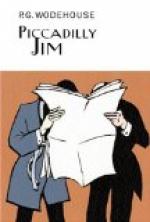The thought of having done anything to make his father unhappy was bitter to Jimmy Crocker. They had always been more like brothers than father and son. Hard thoughts about himself surged through Jimmy’s mind. With a dejectedness to which it is possible that his headache contributed he put the matter squarely to himself. His father was longing to return to America—he, Jimmy, by his idiotic behaviour was putting obstacles in the way of that return—what was the answer? The answer, to Jimmy’s way of thinking, was that all was not well with James Crocker, that, when all the evidence was weighed, James Crocker would appear to be a fool, a worm, a selfish waster, and a hopeless, low-down, skunk.
Having come to this conclusion, Jimmy found himself so low in spirit that the cheerful bustle of Piccadilly was too much for him. He turned, and began to retrace his steps. Arriving in due course at the top of the Haymarket he hesitated, then turned down it till he reached Cockspur Street. Here the Trans-Atlantic steamship companies have their offices, and so it came about that Jimmy, chancing to look up as he walked, perceived before him, riding gallantly on a cardboard ocean behind a plate-glass window, the model of a noble vessel. He stopped, conscious of a curious thrill. There is a superstition in all of us. When an accidental happening chances to fit smoothly in with a mood, seeming to come as a direct commentary on that mood, we are apt to accept it in defiance of our pure reason as an omen. Jimmy strode to the window and inspected the model narrowly. The sight of it had started a new train of thought. His heart began to race. Hypnotic influences were at work on him.
Why not? Could there be a simpler solution of the whole trouble?
Inside the office he would see a man with whiskers buying a ticket for New York. The simplicity of the process fascinated him. All you had to do was to walk in, bend over the counter while the clerk behind it made dabs with a pencil at the illustrated plate of the ship’s interior organs, and hand over your money. A child could do it, if in funds. At this thought his hand strayed to his trouser-pocket. A musical crackling of bank-notes proceeded from the depths. His quarterly allowance had been paid to him only a short while before, and, though a willing spender, he still retained a goodly portion of it. He rustled the notes again. There was enough in that pocket to buy three tickets to New York. Should he? . . . Or, on the other hand—always look on both sides of the question—should he not?
It would certainly seem to be the best thing for all parties if he did follow the impulse. By remaining in London he was injuring everybody, himself included. . . . Well, there was no harm in making enquiries. Probably the boat was full up anyway. . . . He walked into the office.
“Have you anything left on the Atlantic this trip?”




